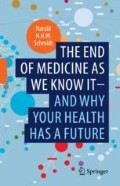Abstract
Most of our genetically defined disease risks will involve so many genes that it will be unrealistic to erase them from our body by gene therapy. They will thus remain a chronic risk or weakness. However, whether they materialize into symptoms will often be preventable by a lifestyle adapted to your personal risk profile. At least the severity of symptoms can be greatly reduced. And this is not your doctor’s job or of any other healthcare provider, but eventually you can and should take charge of yourself. Once this is laid out to you in a precise and targeted manner, this will be more motivating than the current generic approach. Therefore, do not be fobbed off with general tips that are recommended to the entire population as a uniform healthy lifestyle. Much of it won’t apply to you and will only distract you from focusing on what’s important for you. However, if a human geneticist proves to you with hard facts that you personally have an extremely high genetic risk of developing, for example, Alzheimer’s disease and in particular that your sleeping problems and lack of exercise together with increased blood pressure and manifestation of your latent diabetes will make you highly likely to develop dementia in 25 years, then this will trigger a tremendous motivation in you to change precisely these specific lifestyle parameters.
Access this chapter
Tax calculation will be finalised at checkout
Purchases are for personal use only
Notes
- 1.
National Institute of Aging (2019) Alzheimer’s Disease Genetics Fact Sheet. Health Information, https://www.nia.nih.gov/health/alzheimers-disease-genetics-fact-sheet
- 2.
Brzecka A et al. (2018). Sleep Disorders Associated With Alzheimer’s Disease: A Perspective. Frontiers in neuroscience 12:330, https://doi.org/10.3389/fnins.2018.00330
- 3.
Meng Q et al. (2020) Relationship Between Exercise and Alzheimer’s Disease: A Narrative Literature Review. Frontiers in neuroscience 14:131, https://doi.org/10.3389/fnins.2020.00131
- 4.
Ding J et al. (2019) Antihypertensive medications and risk for incident dementia and Alzheimer’s disease: a meta-analysis of individual participant data from prospective cohort studies. Lancet Neurology, pii:S1474–4422(19)30393-X, https://doi.org/10.1016/S1474-4422(19)30393-X
- 5.
Vieira MN et al. (2018) Connecting Alzheimer’s disease to diabetes: underlying mechanisms and potential therapeutic targets. Neuropharmacology 136:160–171, https://doi.org/10.1016/j.neuropharm.2017.11.014; Rosales-Corral S et al. (2015) Diabetes and Alzheimer’s disease, two overlapping pathologies with the same background: oxidative stress. Oxidative Medicine and Cellular Longevity 985,845, https://doi.org/10.1155/2015/985845
- 6.
Kahneman D (2012) Fast thinking, slow thinking. Siedler Verlag, Munich, ISBN 978–3–88,680-886-1
- 7.
#nudge2021 online conference, https://www.laeuft.eu/konferenz-nudging-und-gesundheit/
- 8.
- 9.
- 10.
O’Donnell S et al. (2019) Evidence on User-Led Innovation in Diabetes Technology (The OPEN Project): protocol for a mixed methods study. JMIR Research Protocols 8:e15368, https://doi.org/10.2196/15368
- 11.
Medic G et al. (2017) Short- and long-term health consequences of sleep disruption. Nature and science of sleep 9:151–161, https://doi.org/10.2147/NSS.S134864
- 12.
Bursztyn M et al. (1999) The siesta in the elderly: risk factor for mortality? Arch Intern Med 159:1582–6; Cross N et al. (2015) Napping in older people ‘at risk’ of dementia: relationships with depression, cognition, medical burden and sleep quality. J Sleep Res 24:494–502; Chen G et al. (2015) Afternoon nap and nighttime sleep with risk of micro- and macrovascular disease in middle-aged and elderly population. Int J Cardiol. 187:553–5; Cao Z et al. (2014) The effects of midday nap duration on the risk of hypertension in a middle-aged and elderly Chinese population: a preliminary evidence from the Tongji-Dongfeng Cohort Study, China. J Hypertens. 32:1993–8; Mantua J & Spencer RM (2015) The interactive effects of nocturnal sleep and daytime naps in relation to serum C-reactive protein. Sleep Med. 16:1213–6.
- 13.
- 14.
Freeman D et al. (2017) The effects of improving sleep on mental health (OASIS): a randomised controlled trial with mediation analysis. Lancet Psychiatry 4:749–758, https://doi.org/10.1016/S2215-0366(17)30328-0; Espie C et al. (2012) A randomized, placebo-controlled trial of online cognitive behavioral therapy for chronic insomnia disorder delivered via an automated media-rich web application. Sleep 35:769–781, https://doi.org/10.5665/sleep.1872; Luik A et al. (2017) Treating depression and anxiety with digital cognitive behavioural therapy for insomnia: a real world NHS evaluation using standardized outcome measures. Behav Cogn Psychother 45:91–96, https://doi.org/10.1017/S1352465816000369
Author information
Authors and Affiliations
Rights and permissions
Copyright information
© 2022 The Author(s), under exclusive license to Springer Nature Switzerland AG
About this chapter
Cite this chapter
Schmidt, H.H.H.W. (2022). Self-Therapy. In: The end of medicine as we know it - and why your health has a future. Springer, Cham. https://doi.org/10.1007/978-3-030-95293-8_21
Download citation
DOI: https://doi.org/10.1007/978-3-030-95293-8_21
Published:
Publisher Name: Springer, Cham
Print ISBN: 978-3-030-95292-1
Online ISBN: 978-3-030-95293-8
eBook Packages: Biomedical and Life SciencesBiomedical and Life Sciences (R0)

